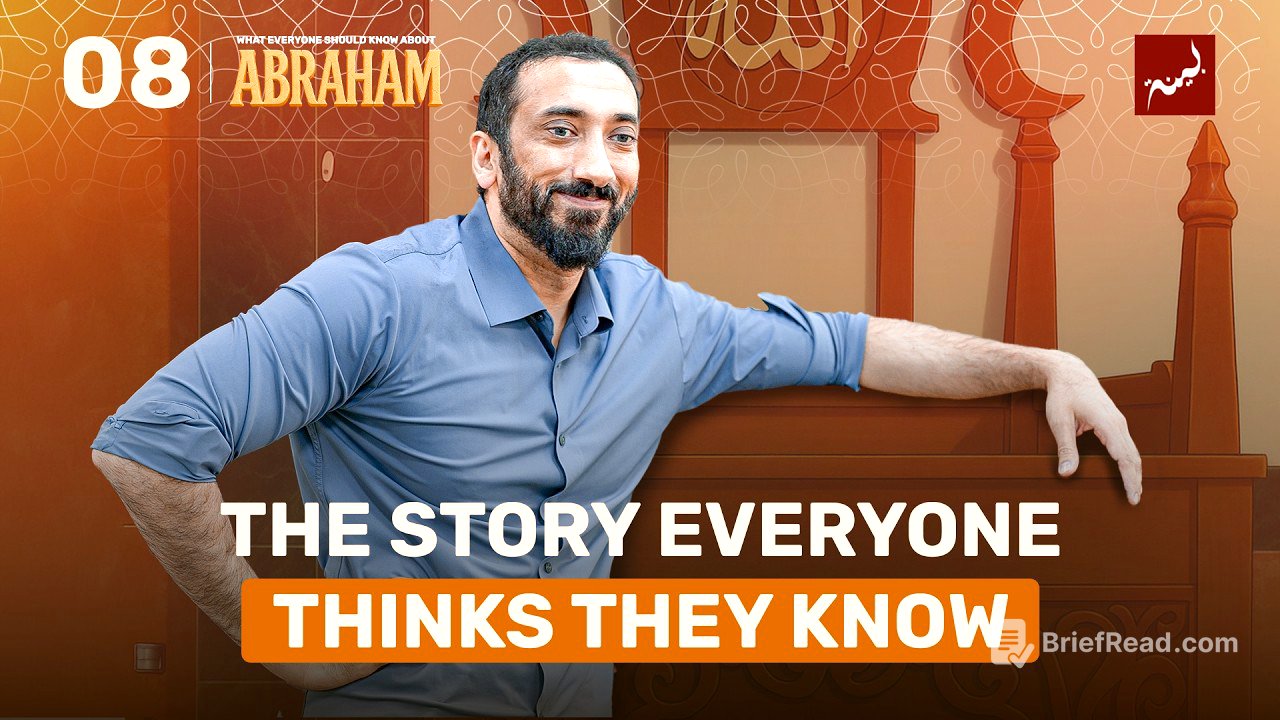TLDR;
This video discusses the significance of Prophet Ibrahim's (Abraham) trials and sacrifices, particularly the story of the sacrifice of his son. It highlights the differences between Islam and other religions regarding the concept of sacrifice, emphasizing that in Islam, sacrifices are not required to please God or earn blessings. The video also touches on the importance of independent thinking and contemplation in Islam, as exemplified by Prophet Ibrahim's search for truth.
- Prophet Ibrahim's trials and sacrifices are central to understanding Islam's unique perspective on faith and submission.
- Islam distinguishes itself from other religions by not requiring sacrifices to appease God or attain blessings.
- Independent thinking and contemplation, inspired by Prophet Ibrahim, are vital in Islam for understanding and strengthening one's faith.
Introduction [0:00]
The video begins by highlighting the unique trials Prophet Ibrahim faced, including being asked to make significant sacrifices, such as slaughtering his own child. The speaker emphasizes that the story of the sacrifice is possibly the most important story in the world's history. He then introduces the two reasons why Muslims believe Islam is the right religion: the contemplation of the universe and the in-depth study of the Quran.
Ibrahim's Sons: Ismael and Ishaq [1:07]
Prophet Ibrahim had two sons who are important in religious history: Ismael, the older son, and Ishaq, born 14 years later from a different wife. Prophet Muhammad is a descendant of Ismael, while many other prophets, including Yakub (also known as Israel), Yusef, Musa, Harun, Zakariah, Sulaiman, and Daud, are descendants of Ishaq. The sons of Yakub are also called the sons of Israel.
The Test of Sacrifice [5:16]
Allah commanded Ibrahim to leave Ismael and his wife in the desert near Safa and Marwa. Later, when Ismael was around 7-9 years old, Ibrahim was tested again through a dream in which he was sacrificing his son. This was a profound test, especially considering Ibrahim's past experiences with his own father, who was willing to sacrifice him. Ibrahim shared the dream with his son, who responded with understanding and willingness to obey Allah's command.
The Significance of the Sacrifice [10:28]
Both Ibrahim and Ismael submitted to Allah's will, but Allah stopped the sacrifice, signifying that it was a demonstration of faith and obedience rather than a literal requirement. This story is often misunderstood, with some questioning how a loving God could ask a father to kill his son. The speaker emphasizes that the sacrifice story is central to the differences between Islam, Judaism, and Christianity.
Islam vs. Other Religions: The Concept of Sacrifice [13:07]
In many ancient religions, sacrifices were performed to appease angry gods or to ask for favors. Allah asked Ibrahim for a sacrifice, but not as an exchange for anything. This highlights a key difference in Islam: it is not a transactional religion where good deeds guarantee specific rewards. Allah's demand was a demonstration of Ibrahim's willingness to submit, and Allah stopped the sacrifice to show that Islam does not require self-harm or the sacrifice of loved ones to gain His pleasure.
Demonstration, Not Sacrifice [17:09]
Ibrahim's life was full of demonstrations of faith, such as questioning the idols and the celestial bodies. The sacrifice was another demonstration to show that Allah does not demand sacrifices in the traditional sense. Islam is not a religion that wants you to hurt yourself or others. Difficulties in life are tests, not sacrifices to earn Allah's favor.
The Legacy of Ibrahim: A Leader and a Blessing [20:35]
The Quran states that Allah replaced the sacrifice with a great sacrifice (of an animal) and left Ibrahim as a legacy for others. Allah also gave Ibrahim the good news of Ishaq, clarifying that Ismael was the son meant for sacrifice. The Bible also acknowledges Ismael as the older son but differs in the interpretation of who was to be sacrificed. Some extreme interpretations suggest that Ismael was cursed, leading to the Prophet Muhammad being from a cursed lineage, but the Quran refutes this. Allah promised to make Ibrahim a leader, but not all his descendants are automatically blessed; they must earn it through faith and good deeds.
Questions and Answers: Trials, Tribulations, and the Right Religion [27:06]
The speaker addresses questions about trials in life and how to know if one is following the right religion. He explains that trials are tests from Allah, and people are tested with both good and bad circumstances. The value of these tests is with Allah alone. The speaker emphasizes that Islam encourages independent thinking and contemplation, as exemplified by Ibrahim's search for truth. The Quran invites people to think deeply about its verses, as it contains no contradictions and offers clarity.
Ibrahim: The Independent Thinker [38:09]
Ibrahim was unique because he thought for himself, unlike those around him who followed groupthink. The Quran encourages reading and thinking, contrasting with other religions that discourage independent thought and encourage blind following. The Quran restores what Ibrahim started, emphasizing the importance of his legacy and the separation of Allah from other gods. Allah does not want us to go through pain and suffering; instead, He made the religion easy through Ibrahim.









